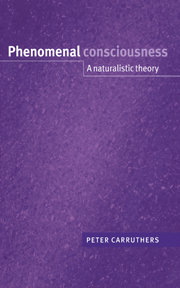Book contents
- Frontmatter
- Contents
- List of figures
- Preface
- 1 Assumptions, distinctions, and a map
- 2 Perspectival, subjective, and worldly facts
- 3 Explanatory gaps and qualia
- 4 Naturalisation and narrow content
- 5 First-order representationalism
- 6 Against first-order representationalism
- 7 Higher-order representationalism: a first defence
- 8 Dispositionalist higher-order thought theory (1): function
- 9 Dispositionalist higher-order thought theory (2): feel
- 10 Phenomenal consciousness and language
- 11 Fragmentary consciousness and the Cartesian theatre
- Conclusion
- References
- Author index
- Subject index
6 - Against first-order representationalism
Published online by Cambridge University Press: 30 September 2009
- Frontmatter
- Contents
- List of figures
- Preface
- 1 Assumptions, distinctions, and a map
- 2 Perspectival, subjective, and worldly facts
- 3 Explanatory gaps and qualia
- 4 Naturalisation and narrow content
- 5 First-order representationalism
- 6 Against first-order representationalism
- 7 Higher-order representationalism: a first defence
- 8 Dispositionalist higher-order thought theory (1): function
- 9 Dispositionalist higher-order thought theory (2): feel
- 10 Phenomenal consciousness and language
- 11 Fragmentary consciousness and the Cartesian theatre
- Conclusion
- References
- Author index
- Subject index
Summary
In chapter 5 I reviewed the case in support of first-order representational (FOR) theories of phenomenal consciousness, and the variety of forms which such theories can take – arguing that some of these varieties are very definitely preferable to others. I argued that FOR theories should not be rejected merely because they are externalist and/or reductionist and/or causal co-variantist – for there remains the possibility that a FOR theory can be constructed around an only partly-reductive notion of narrow content, elucidated in terms of some form of consumer semantics.
In the present chapter I shall set out the case against all FOR accounts, however, of whatever variety. This focuses merely on the first-orderness of such theories, and the argument turns crucially on the real existence of non-conscious experience. The first two sections of the chapter will be concerned to argue for the reality of non-conscious experience, from both common-sense and scientific perspectives. The final two sections will then develop the argument against FOR theory, in the form of a trilemma. The upshot will be that FOR theory fails because it cannot really explain the feel, or ‘what-it-is-likeness’, of phenomenally conscious experience.
Non-conscious experience: the case from common sense
Recall from chapter 5:2.5 that we noted a conceptual distinction between worldly and experiential subjectivity. We can distinguish between what the world (or the subject's own body) is like for an experiencing subject, on the one hand, and what the subject's experience of the world (or of his own body) is like for the subject, on the other.
- Type
- Chapter
- Information
- Phenomenal ConsciousnessA Naturalistic Theory, pp. 147 - 179Publisher: Cambridge University PressPrint publication year: 2000



